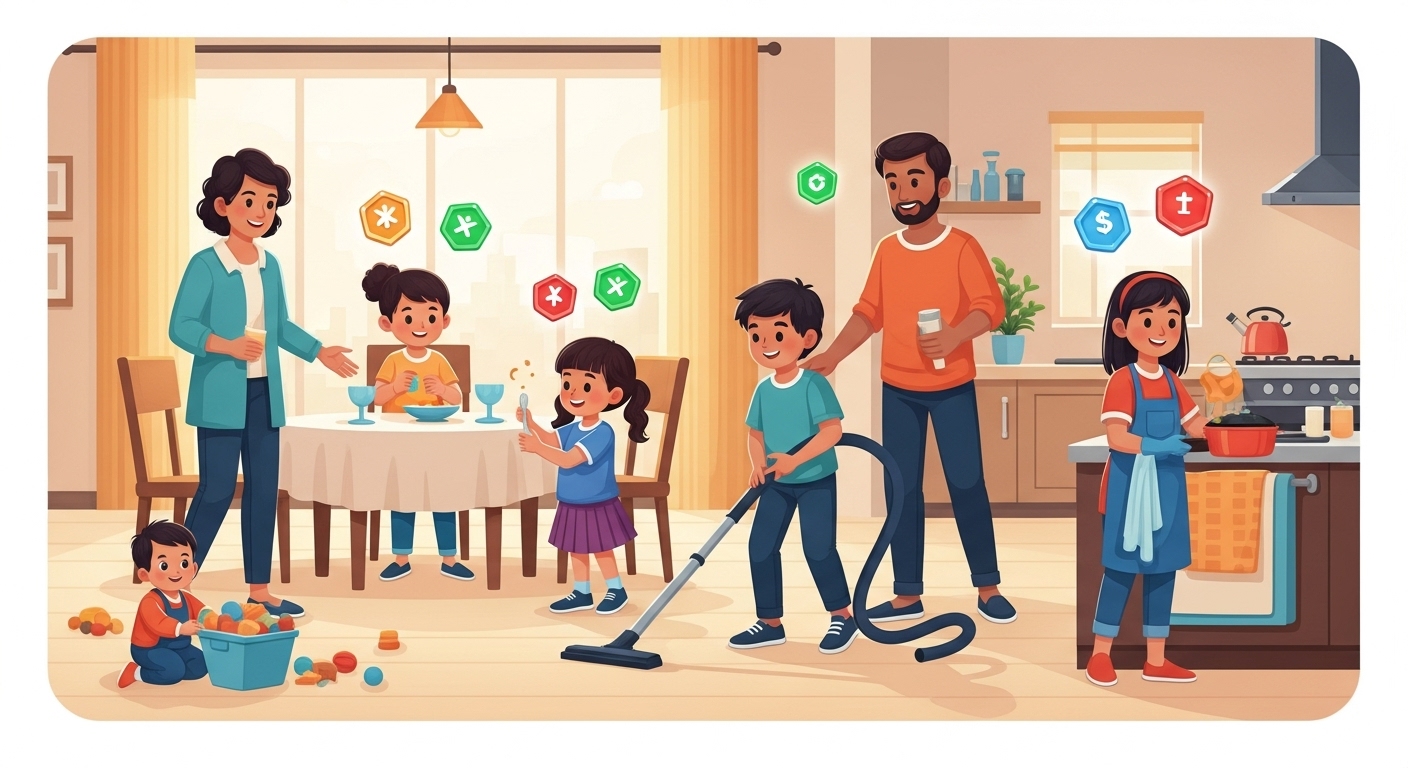
Age-Appropriate Chores: A Complete Guide for Parents
One of the most common questions parents ask is: "What chores should my child be doing at their age?" The answer isn't always straightforward, as every child develops at their own pace. However, there are general guidelines that can help you set appropriate expectations and gradually build your child's sense of responsibility.
Why Age-Appropriate Chores Matter
Assigning chores that match your child's developmental stage is crucial for several reasons:
- Builds confidence through achievable tasks
- Prevents frustration from overly difficult expectations
- Develops motor skills progressively
- Creates positive associations with helping the family
- Establishes realistic expectations for both parent and child
Chores by Age Group
Ages 2-3: The Eager Helpers
At this stage, children are naturally curious and want to help with everything. While their "help" might not always be efficient, it's important to nurture this enthusiasm.
Recommended Chores:
- Put toys away in designated bins
- Carry light items (like their plate to the kitchen)
- Help make the bed (pulling covers)
- Water plants with supervision
- Sort socks by color
- Wipe up spills with paper towels
Tips for Success:
- Make it fun with songs or games
- Provide step stools for accessibility
- Use simple, clear instructions
- Celebrate every effort, no matter how small
Ages 4-5: The Independent Doers
Children at this age have better motor control and can follow multi-step instructions. They're also developing a sense of pride in their accomplishments.
Recommended Chores:
- Set and clear the table
- Feed pets with supervision
- Match socks and sort laundry
- Dust furniture with a microfiber cloth
- Organize books on shelves
- Pack their own backpack for school
- Water plants independently
Tips for Success:
- Create visual checklists with pictures
- Allow extra time for task completion
- Provide child-sized tools and supplies
- Focus on effort rather than perfection
Ages 6-8: The Capable Contributors
School-age children can handle more complex tasks and understand the importance of contributing to the household.
Recommended Chores:
- Load and unload the dishwasher
- Vacuum their bedroom
- Fold and put away their clothes
- Prepare simple snacks
- Take out trash from bedrooms
- Rake leaves or do light yard work
- Help with grocery shopping
Tips for Success:
- Establish clear expectations and consequences
- Provide gentle reminders rather than nagging
- Allow them to choose some of their chores
- Link chores to privileges or allowance
Ages 9-11: The Responsible Helpers
Pre-teens can manage more sophisticated tasks and understand the connection between their contributions and family functioning.
Recommended Chores:
- Load and run the washing machine
- Prepare simple meals
- Clean bathrooms (with appropriate supplies)
- Organize their own bedroom thoroughly
- Help with family meal planning
- Babysit younger siblings briefly
- Manage their homework schedule
Tips for Success:
- Teach proper techniques for safety
- Gradually increase responsibility
- Allow them to problem-solve independently
- Recognize their growing maturity
Ages 12+: The Young Adults
Teenagers can handle nearly any household task and should understand their role as contributing family members.
Recommended Chores:
- Do their own laundry completely
- Cook meals for the family
- Deep clean areas of the home
- Manage their own schedules and responsibilities
- Run errands (age and transportation permitting)
- Help with family budgeting and planning
- Maintain outdoor spaces
Tips for Success:
- Respect their growing independence
- Involve them in family decisions
- Allow natural consequences for incomplete tasks
- Acknowledge their adult-level contributions
Common Challenges and Solutions
Challenge: "My child forgets to do their chores"
Solutions:
- Create visual reminders (charts, apps, or sticky notes)
- Establish consistent routines
- Use positive reinforcement for remembering
- Link chores to daily privileges
Challenge: "The quality isn't good enough"
Solutions:
- Remember that learning takes time
- Focus on effort and improvement, not perfection
- Provide gentle instruction and guidance
- Celebrate progress, not just results
Challenge: "My child complains about chores"
Solutions:
- Involve them in choosing some of their tasks
- Explain the "why" behind household contributions
- Make chores more enjoyable with music or games
- Recognize and appreciate their efforts regularly
Making Chores Engaging with KiddiKash
Technology can be a powerful tool for making chores more engaging. KiddiKash helps by:
- Gamifying tasks with points and rewards
- Providing age-appropriate task suggestions
- Tracking progress over time
- Celebrating achievements with badges and recognition
- Connecting family members through shared goals
Creating a Positive Chore Culture
Remember that the goal isn't just to get tasks done – it's to raise responsible, capable individuals who understand the value of contributing to their community. Here are some final tips:
- Model the behavior you want to see
- Work alongside your children when possible
- Acknowledge their contributions regularly
- Adjust expectations as they grow and develop
- Make it about family teamwork, not just individual tasks
Conclusion
Age-appropriate chores are an investment in your child's future. By gradually increasing responsibility and maintaining realistic expectations, you're helping them develop valuable life skills while contributing to your family's success.
Remember, every child is different, and what works for one family might need adjustment for another. The key is to start where your child is, celebrate their efforts, and gradually build their confidence and capability.
Tags
Looking for a fun way to manage family chores? Turn household tasks into engaging adventures for your whole family!Join KiddiKash.